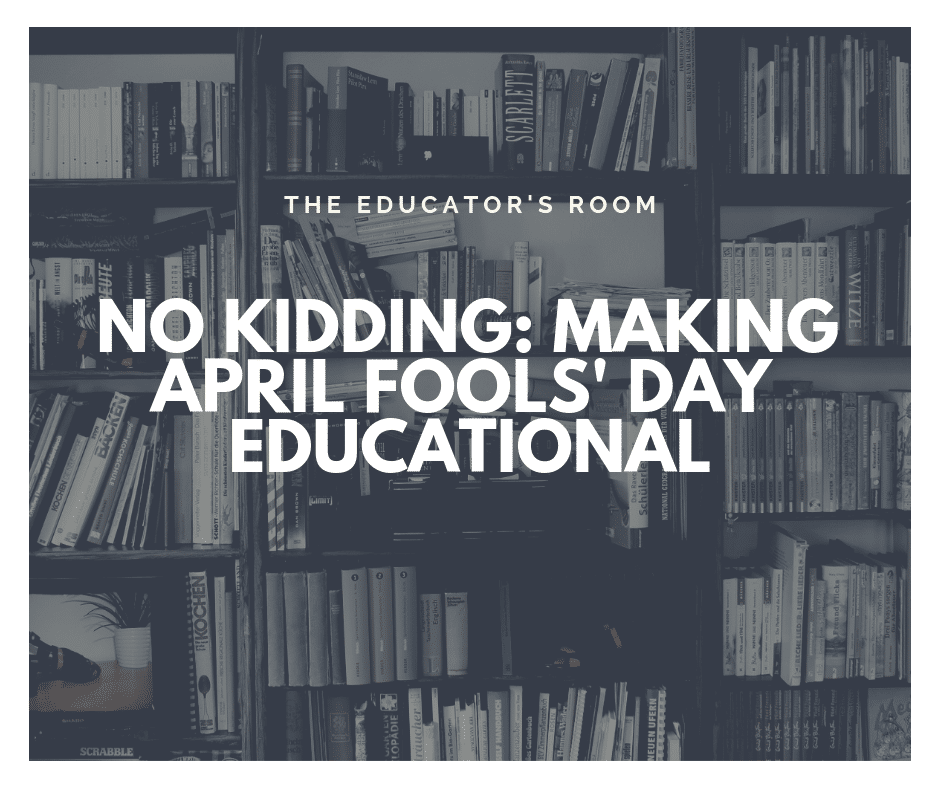Yes, you read the title correctly. April Fools’ Day can actually be educational! Typically, around this time, articles and ideas circulate providing teachers with ideas on how to prank their students and colleagues. You’ll see posts and videos of teachers trying their best to outwit their students on this day. While it is great to have a little fun from time to time, April Fools’ Day could also be used to illustrate some important lessons to students that will have a lasting effect beyond the fake spelling tests, pop quizzes, and brown “E’s” on a platter.
Although the exact origin of April Fools’ Day is somewhat of a mystery, one of the theories is that it began in the 1500s when France switched from the Julian calendar to the Gregorian calendar.
“People who were slow to get the news or failed to recognize that the start of the new year had moved to January 1 and continued to celebrate it during the last week of March through April 1 became the butt of jokes and hoaxes.”
“Slow to get the news” speaks of an even broader matter that we are dealing with in our current system and time. How we obtain news and the accuracy of that news, which has now been coined “fake news,” is a topic that remains at the forefront of our society. The increased use of technology and the overwhelming accessibility to students brings the era of fake news to our classroom doorsteps. So, why not use April Fools’ day to our advantage as educators, by incorporating meaningful analysis around understanding and deciphering our news and the messages they send.
Earlier this month, I attended SXSW EDU and participated in some great sessions on everything from equity in education to hearing Lavar Burton speak on literacy. One of the sessions I attended was “Teaching in the Era of Fake News.” This session was conducted by two high school teachers, Emily Glankler and Emily Pool. I love attending sessions led by teachers who are still in the classroom because the content is drawn from authentic classroom experiences. This session also opened my eyes even further on the need for students to not be fooled by fake news.
The presenters shed light on four reasons why teaching about fake news matters:
- Americans are finding less common ground with each other.
- Anxiety in young people continues to increase.
- Communication and collaboration are soft skills that employers desire and also ones our students are missing.
- The majority of young professionals cannot spot fake news.
Being Fooled by Fear
One message that was clear in this session (and also one that I hear often from teachers) is that fear is a driving force that keeps discussions about fake news out of the classroom. Often you’ll find that some teachers are afraid to address current events and controversial topics because of our current climate, parent/administrative backlash, or simply not knowing how to address topics in a constructive way. However, being inactive, due to fear, has never been the best route to positive change. Part of the magic of education is that we have the ability to transform society. When we look at various matters in our world, it is clear that how we function as a society has created some of the very issues we end up having to fight against. Our students need tools to navigate the world in which they live and the world that is to come. If we don’t change our methods and allow fear to dictate our pedagogy, our chances to transform society for the better will continue to dwindle.
How to Prevent Students from being Fooled by Fake News
Three ideas were given in our session on how schools/classrooms can begin to address the fake news era:
- Rethink media literacy.
- Normalize current events in the classroom.
- Evaluate bias and fake news as valuable sources of information.
As much as we have the best intentions as teachers, we sometimes remove the opportunity for learning in exchange for maintaining control. Telling students which websites and sources they can and cannot use, presenting students with a limited choice, dictating what is good or bad about a source, or simply not including certain texts….all contribute to eliminating opportunities for students to think critically about their own learning.
“ My definition of a good teacher has since changed from “one who explains things so well that students understand” to “one who gets students to explain things so well that they can be understood.” –Robert Kaplinsky
Students need to be taught how to analyze information, think critically, and have productive, respectful conversations on various topics. Aren’t these some of our goals as educators? Heck, we even need that for ourselves as we know that adults have the same issues navigating information respectfully. How often do we give space for this in our classrooms?
Great educators know that skills combined with high interest topics/real world application yield results and increases engagement.
In order to do this we must:
- Stop being afraid to tackle hard things.
- Intentionally plan ways to incorporate analysis regularly in the classroom.
- Trust students to think; stop telling and let students explore.
- Allow students to notice & wonder (this is a common math strategy, but I have adapted it for E/LA when analyzing texts and know that it can work well in any content area)
- Provide a controlled environment for class discussions.
- Socratic seminars
- High yield strategies to facilitate collaborative work, brainstorming, etc.
- Become comfortable with teachable moments- if students are buzzing on a topic or entering the classroom with misinformation, USE IT! Take the time to explore matters to show students that analysis is a method that is always worth using.
Resources for Teaching about Fake News
Stuck on how to establish a classroom environment in which students cannot be fooled?
Check out the following resources:
- Anti-Social Studies website: Emily Glankler’s site to help teachers teach authentic historical content
- Teaching in the Era of Fake News- SXSW EDU resources – lessons, texts, and resources for facilitating productive and safe analysis of fake news and controversial issues.
- SXSW EDU Google Slides Presentation (also available on the Anti-Social Studies website
- Using April Fools Stories to Identify Fake News– Forbes article that details what researchers use to dismantle misinformation
“There’s a lot of really interesting work in fighting disinformation at the moment. It’s particularly important because society’s really struggling to adjust to the volume of information that is now available and it’s having real consequences.” –Edward Dearden
It goes without saying that we need to ensure that topics and exploration are appropriate. Nonetheless, we also should ensure that we are not shielding students from much-needed lessons due to perceived barriers or fear. As you go about your April Fools’ Day and week with light-hearted pranks and jokes, let’s also not forget about all the teachable moments this day can bring.





